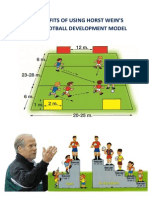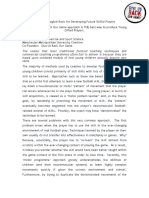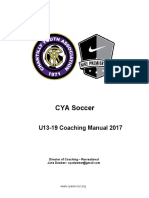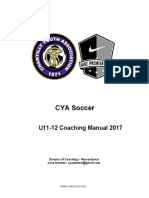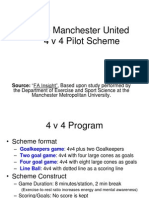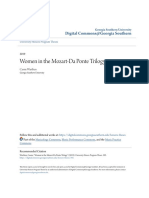How Can We Help Create Who Can Invent The Future of The Game? (For Coaches of Under 12 Year Old Players)
How Can We Help Create Who Can Invent The Future of The Game? (For Coaches of Under 12 Year Old Players)
Uploaded by
api-141109223Copyright:
Available Formats
How Can We Help Create Who Can Invent The Future of The Game? (For Coaches of Under 12 Year Old Players)
How Can We Help Create Who Can Invent The Future of The Game? (For Coaches of Under 12 Year Old Players)
Uploaded by
api-141109223Original Title
Copyright
Available Formats
Share this document
Did you find this document useful?
Is this content inappropriate?
Copyright:
Available Formats
How Can We Help Create Who Can Invent The Future of The Game? (For Coaches of Under 12 Year Old Players)
How Can We Help Create Who Can Invent The Future of The Game? (For Coaches of Under 12 Year Old Players)
Uploaded by
api-141109223Copyright:
Available Formats
How can we help create players who can invent the future of the game?
(for coaches of under 12 year old players)
There is little doubt that skill levels among top football players have evolved over the past 30 to 40 years. Players like Maradona and Ronaldinho have lead the way in evolving new moves and taking skill levels beyond what was thought to be possible. Cruyff made a particular turn famous so famous that it has been named after him and appears in almost every skills coaching manual. More recently, Cristiano Ronaldo delivered a straight and spinless free-kick against Portsmouth that whistled over the wall and dropped suddenly into the net, defying science and questioning what decades of coaches have been telling their students about how to get a ball up and down quickly again. The game is constantly growing as more players are adding to what we know is possible. Someone looking at todays game from the viewpoint of thirty years ago would be amazed by what some of todays players can do. There is no doubt that football will continue to develop and evolve. Creative players from all over the world will extend what is possible. What will the game look like in twenty or thirty years time? How can we as coaches help develop our players to be the ones who invent football, have new moves named after them in future coaching manuals, set new limits as to whats possible, and play football that inspires and brings joy?
Adults in a childrens world
Our society no longer allows for street football or playground football in the way that it used to. These environments have been replaced by more ordered and structured football practices, usually lead by adults. As well as reducing the time available for children to play and learn football, the adultcentred environment is often also more pressured, more restrictive, and less fun. As adults in a childrens play environment whether that be as a coach or a parent some of us express our perceived role as leader and organiser by rigid command, and even shouting and screaming. For example, if a child in a game has the ball near his own goal, the parents will shout Kick it! from the sidelines and they are very happy when the child hits the ball as far up the field as they can. The child, responding to the parents anxiety, learns to boot the ball up the field as far as they can each time they get it. As well as creating anxious children, this type of command coaching means that we develop players who are dependant on sideline coaching and do not have the skills to solve problems on the field for themselves. Far too often, adults put winning at the top of our agenda. We often enforce this agenda on our young players, often at the expense of creativity, enjoyment and invention. I have never believed that competition is not important in childrens sport some children will naturally be more competitive than others. I have coached 7 year olds who want to win as much as any adult I know, but it is not an adults place to interfere with this competitive desire or lack of it. If we want our players to invent the future game of football, we need to allow them to take ownership of it, allow them to make their own rules and set their own limits. For young children this means allowing the goalkeeper to come and take the throw-in if thats what they feel like doing, or letting the defender dribble out of the penalty area (even if theyve tried it once and it lead to a goal conceded). Theres a great poster
I saw recently that sums this up. It was designed for the parents viewing area at an Academy: A picture of a little child sitting under a tree reading a book, with a caption You wouldnt shout at me while Im learning to read!
Invention doesnt happen the first time
In order to allow children to invent their own football, we need them to be self-expressed and creative, and to have the confidence to try new things. Along the way, things will not always go according to our adult-centred plan, and our players will make many mistakes. We need to create learning environments where its ok for our players to try something different, for it not to work, and still want to try something new again. If we look back at Cristiano Ronaldos free-kick: I am quite sure that goal was not the first time he tried it. He must have practised for hours on a training ground to get that technique just right, and made many mistakes along the way. Imagine if he had had a coach that didnt allow for those mistakes, someone that insisted that he shot the ball in the agreed Beckham way instead? He would never have been able to invent the game and extend for everyone what is now possible.
Teach, but dont set limits on what can be learned
As adults, we often think we know best. We think we know exactly what a child is able to do or not do, we think we know how good they are and how good they can become. We set limits on their learning, we tell them what to do. We limit for them what is possible. Of course, we need our players to master all the techniques we know about to be able to turn like Cruyff, to cushion the ball to the floor with the knee, to bend it like Beckham. We need coaches who can teach these techniques, and teach them well. But we also need coaches who can challenge their players to find other ways of achieving the same outcome to invent their own part of football, to take ownership of their learning and set their own limits as to whats possible. We always need to consider that we adults dont know everything, that one day someone will do something with a ball that we never thought was possible and would never have dreamed to teach. In practice this means giving children time to explore and create. For example, when teaching the technique of turning or changing direction, the coach could give time for each of the group to invent a turn of their own something that works best for them. Then in pairs they could teach their new turn to each other (thus putting them in a position of being both teacher and learner). By doing this, we let the children discover for themselves that there are a huge variety of ways of moving a ball. We do not limit their imagination by telling them there are only a five or six turns that exist. We keep the possibility of discovery open to them, and the magic of creativity in football alive. Remember, that it was largely due to this creativity and freedom in childrens playtime that street, park and playground football were so popular for previous generations.
Implications for Coach Education
Hundreds of coaches take Level 1 and Level 2 courses with the FA each year. I would say that their experiences are mixed, influenced mainly by who runs the course. In my experience some coach educators are hugely better than others; as in all courses of study, the quality of the students experience is more dependent on the quality of the teacher than on the content of the curriculum. Having said this, there are changes we could make to the content of the courses that would improve the student coaches ability to help develop inventive players. We must have a Coach Education system that aims for our children to learn beyond what we know is possible. Rather than just teaching within what we know, we must aim for the new generation of players to surpass us adults to evolve the game and invent the future. Although the type of Stop-Stand-Still coaching we see at Level 2 and 3 has its place, we need to give coaches many more tools than this.
Beginner coaches need examples of how to enhance creativity among children. They need to be shown how children can be encouraged to take ownership of their own learning, how to create child-centred environments, and how to guide young learners to new answers and different solutions through exciting and varied games and activities. Team coaches need the skills to manage and develop teams of people. They need demonstrations of how to coach effectively from the sidelines without restricting the players natural urge for self-expression, how to set process goals with the parents and players, and how to help their team to review these goals at half and fulltime. The FA are re-structuring the Coach Education courses to include pathways all the way to UEFA A for coaches of particular age-groups of player. So it will be possible to do Levels 2, 3 and 4 all for coaching ages 5-11 for example. This is definitely a step in the right direction. I have no doubt that the content of these courses will be much more relevant to the needs of coaches working with particular age-groups; the biggest challenge for the FA is whether they can find the dynamic, empowering and inspirational coach educators capable of delivering them at a level which really makes a difference at a national scale.
Mark Carter, Director, Ministry of Football From 2004 to 2007, he was Director of Junior and Youth Coaching at Three Kings United, the biggest club in New Zealand. He coached international age-group players and on National Academies, and was a Coach Educator running Level 1 and 2 courses. Prior to coaching in New Zealand, he spent three years in Papua New Guinea, coaching school and Regional teams and coaching the Madang team to an FA Cup win in 2003. Returning home to London in July 2007, he now coaches 7-9 year olds at Watford FC Boys Academy and 13-14 year old girls at the Girls Centre of Excellence. He is completing the process of transferring his NZ qualifications over to English FA/UEFA, and will be studying on the FA Youth Coaches course in June 2008. Ministry of Football Ministry of Football is an indoor football programme for children aged 6-14. It mixes football skill and small-sided game activities with dance music. They aim to help develop players and children who are creative, confident and self-expressed. They will be starting a Parent-Child class this year, with the aim of providing a quality environment for families to play together, and to give parents the skills and confidence to continue teaching and playing with their children beyond the sessions.
You might also like
- Player Development GuidelinesDocument26 pagesPlayer Development Guidelineslatierrajl100% (2)
- Final Pre Board-exam-100-Plumbing-code & Practical ProblemsDocument20 pagesFinal Pre Board-exam-100-Plumbing-code & Practical ProblemsAnthony Kervin Dela Cruz88% (8)
- Soccer Drills: A 100 Soccer Drills to Improve Your Skills, Strategies and SecretsFrom EverandSoccer Drills: A 100 Soccer Drills to Improve Your Skills, Strategies and SecretsRating: 5 out of 5 stars5/5 (1)
- Developing Skill 2: A Guide to 3v3 Soccer CoachingFrom EverandDeveloping Skill 2: A Guide to 3v3 Soccer CoachingRating: 4 out of 5 stars4/5 (1)
- Street Soccer USA Coaches PlaybookDocument50 pagesStreet Soccer USA Coaches PlaybookRob Cann100% (2)
- 100 Benefits 2012 H 140221193123 Phpapp01Document10 pages100 Benefits 2012 H 140221193123 Phpapp01Marcio De Souza RochaNo ratings yet
- Stella Adler On America's Master Playwrights,' LecturesDocument6 pagesStella Adler On America's Master Playwrights,' LecturesWwe Full matches100% (1)
- General Test Answer KeyDocument5 pagesGeneral Test Answer KeyMedina M. Jose100% (1)
- A Professional Growth Plan Incorporating The STP ProcessDocument3 pagesA Professional Growth Plan Incorporating The STP Processapi-538028309No ratings yet
- Bob BoyceDocument47 pagesBob BoyceDmitryRussuNo ratings yet
- Best Practices v2Document71 pagesBest Practices v2api-279807074No ratings yet
- Best Practices BookletDocument69 pagesBest Practices BookletBoka JuniorNo ratings yet
- USSF Best PracticesDocument70 pagesUSSF Best Practicestimhortonbst100% (5)
- UsyscoachingmanualDocument105 pagesUsyscoachingmanualapi-171510718No ratings yet
- Give Us Back Our GameDocument5 pagesGive Us Back Our GameredstarfutsalNo ratings yet
- Soccer Intelligence: Soccer Training Tips To Improve Your Spatial Awareness and Intelligence In SoccerFrom EverandSoccer Intelligence: Soccer Training Tips To Improve Your Spatial Awareness and Intelligence In SoccerRating: 5 out of 5 stars5/5 (1)
- Basic Soccer Drills for Kids: 150 Soccer Coaching and Training Drills, Tactics and Strategies to Improve Kids Soccer Skills and IQFrom EverandBasic Soccer Drills for Kids: 150 Soccer Coaching and Training Drills, Tactics and Strategies to Improve Kids Soccer Skills and IQRating: 5 out of 5 stars5/5 (2)
- Elevating-Youth-Soccer PreviewDocument13 pagesElevating-Youth-Soccer PreviewRiad BouNo ratings yet
- Academy Coaching ManualDocument67 pagesAcademy Coaching ManualAfa Apacinti100% (1)
- 2012 Soccer Coaching ManualDocument105 pages2012 Soccer Coaching ManualtheatrestudentNo ratings yet
- 1st Year CoachDocument63 pages1st Year CoachJohn Merritt100% (1)
- Teaching Football in LEDC'sDocument48 pagesTeaching Football in LEDC'sVedant JainNo ratings yet
- Asc Ajax Players Development ManualDocument35 pagesAsc Ajax Players Development ManualIC100% (2)
- SS360 U9 Coaching ManualDocument55 pagesSS360 U9 Coaching ManualDulantha SrimalNo ratings yet
- US Youth Soccer U6-U8 Practice ActivitiesDocument52 pagesUS Youth Soccer U6-U8 Practice Activitiesdoyou67100% (1)
- Coaches Training Manual U9&U10 House: Philosophy of CoachingDocument17 pagesCoaches Training Manual U9&U10 House: Philosophy of CoachingMirko Granese100% (1)
- Soccer Drills for Kids Ages 8-12: From Tots to Top Soccer Players: Outrageously Fun, Creative and Challenging Soccer Drills for Kids Ages 8-12From EverandSoccer Drills for Kids Ages 8-12: From Tots to Top Soccer Players: Outrageously Fun, Creative and Challenging Soccer Drills for Kids Ages 8-12No ratings yet
- Grassroots Manual: Football Association of SingaporeDocument187 pagesGrassroots Manual: Football Association of SingaporeErrorry Jeckson100% (1)
- Constraining U8 Tennis by Steve WhelanDocument114 pagesConstraining U8 Tennis by Steve WhelanVladimir GeorgijevskiNo ratings yet
- Name: Clae Sensenig School/Mentor Name: Excel Charter Academy, Matt Sicilia Grade/Subject: 7 and 8 Grade General Topic: BasketballDocument4 pagesName: Clae Sensenig School/Mentor Name: Excel Charter Academy, Matt Sicilia Grade/Subject: 7 and 8 Grade General Topic: Basketballapi-355586579No ratings yet
- Creative Mind. Development of Free-Thinking Football PlayersFrom EverandCreative Mind. Development of Free-Thinking Football PlayersNo ratings yet
- G3.module SoccerDocument33 pagesG3.module SoccerNyzell Mary S. ZablanNo ratings yet
- Simplifying The Game By: Jon TownsendDocument7 pagesSimplifying The Game By: Jon TownsendJon Townsend0% (1)
- Organized To Be The Best, Not The BiggestDocument4 pagesOrganized To Be The Best, Not The BiggestSheikh MohdNo ratings yet
- USYouthSoccer U10 Practice ActivitiesDocument53 pagesUSYouthSoccer U10 Practice ActivitiesPierce PresleyNo ratings yet
- Premier Skills Football HomeworkDocument5 pagesPremier Skills Football Homeworkafmtbyuao100% (1)
- Assigment 1 EDN116Document6 pagesAssigment 1 EDN116Kirra Simmons100% (1)
- SoccerSource360 U8 Coaching Manual PDFDocument76 pagesSoccerSource360 U8 Coaching Manual PDFPatri BustosNo ratings yet
- US-Youth-Soccer-Coaching-Manual Content 1Document106 pagesUS-Youth-Soccer-Coaching-Manual Content 1raymond.mtlynnNo ratings yet
- A Guide To Coaching Recreational SoccerDocument24 pagesA Guide To Coaching Recreational SoccerGerardo M.No ratings yet
- PaheDocument10 pagesPaheArnav ReddyNo ratings yet
- 7V7 Mod Soccer TeamsDocument17 pages7V7 Mod Soccer TeamsRafa PesiNo ratings yet
- Final Spring 2017 U13 CYA Curriculum - FinalDocument40 pagesFinal Spring 2017 U13 CYA Curriculum - FinalAndrei PopescuNo ratings yet
- Coaches Manual - Captial Area SoccerDocument37 pagesCoaches Manual - Captial Area SoccerriverbendfcNo ratings yet
- Youth Soccer Development: Progressing the Person to Improve the PlayerFrom EverandYouth Soccer Development: Progressing the Person to Improve the PlayerNo ratings yet
- Final Spring 2017 U11-12 CYA Curriculum - FinalDocument40 pagesFinal Spring 2017 U11-12 CYA Curriculum - FinalAndrei PopescuNo ratings yet
- Developing Soccer Players: Forward-Specific PracticesFrom EverandDeveloping Soccer Players: Forward-Specific PracticesRating: 5 out of 5 stars5/5 (1)
- Grassroots Coaches GuideDocument34 pagesGrassroots Coaches GuideRicardo FariasNo ratings yet
- Disability ToolboxDocument6 pagesDisability Toolboxryan.lazaroeNo ratings yet
- Grasrooots Manual UAEDocument144 pagesGrasrooots Manual UAEKnowledge Is Mania100% (3)
- Spanish Style Possession Soccer Vol 1Document51 pagesSpanish Style Possession Soccer Vol 1Sportz KatNo ratings yet
- Coaching YouthDocument30 pagesCoaching Youthvspeeder100% (2)
- 5 ThingsDocument20 pages5 Thingsjeremy chewNo ratings yet
- Gaacoaching 12 01 23 FinalDocument9 pagesGaacoaching 12 01 23 FinalJake Logan CondonNo ratings yet
- Soccer Passing Lesson PlanDocument8 pagesSoccer Passing Lesson Plankatykohli100% (1)
- Playing Time: Guidelines for Coaches, Athletes, & Parents: Coaching MasteryFrom EverandPlaying Time: Guidelines for Coaches, Athletes, & Parents: Coaching MasteryNo ratings yet
- Plan For IntramsDocument7 pagesPlan For IntramsRuden Clark Castor IpiliNo ratings yet
- Building Champions - Effective Coaching Techniques for Middle School BasketballFrom EverandBuilding Champions - Effective Coaching Techniques for Middle School BasketballNo ratings yet
- Providing Movement Demonstrations and Instructions When Coaching New Movement Skills: Some Cautionary AdviceDocument2 pagesProviding Movement Demonstrations and Instructions When Coaching New Movement Skills: Some Cautionary Adviceapi-141109223No ratings yet
- Let The Kids Play: John Allpress - The Football Association, England - Tuesday, July 17, 2007Document1 pageLet The Kids Play: John Allpress - The Football Association, England - Tuesday, July 17, 2007api-141109223No ratings yet
- Defending PracticeDocument1 pageDefending Practiceapi-141109223No ratings yet
- The Manchester United 4 V 4 Pilot SchemeDocument6 pagesThe Manchester United 4 V 4 Pilot Schemeapi-141109223No ratings yet
- Win at All Costs VS Development: Something Better ChangeDocument2 pagesWin at All Costs VS Development: Something Better Changeapi-141109223No ratings yet
- THE Comfort ZoneDocument3 pagesTHE Comfort Zoneapi-141109223No ratings yet
- Subu-CFA Level 1 - Fixed Income Flashcards - QuizletDocument16 pagesSubu-CFA Level 1 - Fixed Income Flashcards - QuizletCarlos RivasNo ratings yet
- Spesifikasi CARL ZEISS Opmi Lumera T PDFDocument1 pageSpesifikasi CARL ZEISS Opmi Lumera T PDFJimmyNo ratings yet
- Women in The Mozart-Da Ponte TrilogyDocument31 pagesWomen in The Mozart-Da Ponte TrilogyElena LisovenkoNo ratings yet
- POKÉMON DossierDocument17 pagesPOKÉMON DossierSusanna GarciaNo ratings yet
- 5409 16570 1 PBDocument3 pages5409 16570 1 PBShinta VivinNo ratings yet
- DESOLATIONDocument2 pagesDESOLATIONDani PermanaNo ratings yet
- Allied 3the Declaration of Independence - 220816 - 220352Document51 pagesAllied 3the Declaration of Independence - 220816 - 220352Adman AlifAdmanNo ratings yet
- Carolina Garcia Murder On A Sunday Morning Extra Credit PaperDocument5 pagesCarolina Garcia Murder On A Sunday Morning Extra Credit Paperghous_ali3256No ratings yet
- 2 DinnersDocument3 pages2 Dinnersapi-193463138No ratings yet
- Short Note (English Language)Document52 pagesShort Note (English Language)Shalehin IslamNo ratings yet
- NCM 101A 13 Areas of AssessmentDocument4 pagesNCM 101A 13 Areas of AssessmentGladys JhayeNo ratings yet
- 2a-B Fire ModelsDocument66 pages2a-B Fire ModelsUzair Maqbool KhanNo ratings yet
- Basic Shortcut Keys (Microsoft Products)Document6 pagesBasic Shortcut Keys (Microsoft Products)Banhi100% (1)
- Islamic Education Philosophy: Al-Kindi: Philosophy Consist of 3 AspectsDocument4 pagesIslamic Education Philosophy: Al-Kindi: Philosophy Consist of 3 Aspectsthenoelle24No ratings yet
- Job AnalysisDocument5 pagesJob AnalysisEMMANUELNo ratings yet
- All Gearbox MD LABDocument108 pagesAll Gearbox MD LABkyaji raut0% (1)
- Grade 4 - Project IntegrationDocument1 pageGrade 4 - Project IntegrationCHRISTINE MEDICONo ratings yet
- Kids Activities Birmingham - Google SearchDocument1 pageKids Activities Birmingham - Google Searchluulfarah99No ratings yet
- Global LaunchDocument11 pagesGlobal LaunchNicole De GuzmanNo ratings yet
- Fpga Based Object Tracking System: Project ReportDocument12 pagesFpga Based Object Tracking System: Project ReportAchraf El aouameNo ratings yet
- Chapter 1 EconDevDocument29 pagesChapter 1 EconDevKhitz CryztyNo ratings yet
- SWOT AnalysisDocument6 pagesSWOT Analysisabbas_sohail110100% (1)
- Elements of PoetryDocument30 pagesElements of PoetryAne SierasNo ratings yet
- Failure Mechanisms of Insulated Gate Bipolar Transistors (Igbts)Document30 pagesFailure Mechanisms of Insulated Gate Bipolar Transistors (Igbts)Wee Chuan PoonNo ratings yet
- Demag CC1800Document45 pagesDemag CC1800Mohd FadliNo ratings yet







